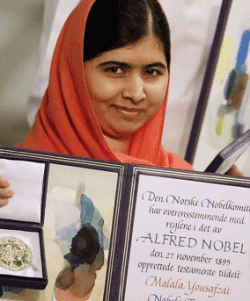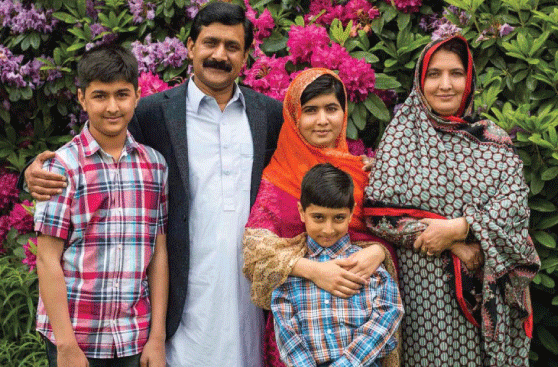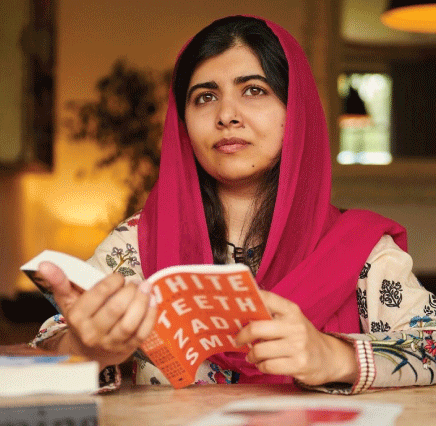Malala Yousafzai
Malala Yousafzai, the daughter of an educational activist, is a noble peace prize winner and the youngest one to receive this award. Malala Yousafzai, whose name is pronounced as ????? ??????? in Urdu & ????? ?????? in Pashto, is popularly known as Malala mononymously. Malala Yousafzai is a female education activist whose full married name is Malala Yousafzai Malik. The impact of Malala Yousafzai's popularity can be measured with the following statement of former Prime minister (PM) of Pakistan: "Malala Yousafzai is the most prominent citizen of Pakistan as well as one of the most prominent citizens in the world." This young girl's journey from a normal citizen to be the youngest noble peace prize winner is an inspiration for many. She always worked for human rights (especially for women's rights in education), and her movements were always peaceful. Even though she always tried that her movements remain peaceful, there were many attempts in the past where many assassinations tried to kill her so that they could stop her movements. Even after all this, she is still working for human rights and women's education rights which gives inspiration to all the other girls to take a stand for themselves and others too. Knowing about the life of Malala Yousafzai is always inspirational, and one can learn many things from this young girl who has achieved so many things at such a young age. Malala Yousufzai: An IntroductionChildhood and FamilyMalala Yousafzai, who is popularly known as Malala mononymously, was born on 12th July 1997 in a small village (Mingora, Khyber Pakhtunkhwa) of Pakistan. The name Malala Yousafzai have different pronunciations in different languages like it is pronounced as ????? ??????? in Urdu & ????? ?????? in Pashto. Currently 24 years old, Malala was only 16 when she won the noble peace prize award, which got her so much fame popularity globally. Her father, Ziauddin Yousafzai, was also an education activist and used to run a chain of schools in the region. Malala Yousafzai was always inspired by her father's humanitarian work and her selfless thoughts to help needy ones when they are capable of doing so. Taking inspiration from her father and making Benazir Bhutto & Muhammad Ali Jinnah her role models, she also started working towards women's education rights at a very young age. For this, she got full support from her family, and her father whole-heartedly accepted her decision to be an activist. The advocacy of Malala Yousufzai for human rights, education rights for children and women's education rights grew into an international movement which led her to become an internationally recognized activist. In 2014, when Malala Yousufzai received a noble peace prize for her humanitarian work and movements for human rights as well as women's right to education, she became the youngest one and only the second Pakistani to receive this award. 
Malala Yousufzai, whose married name is Malala Yousafzai Malik, began her advocacy for human rights, especially for women and children's education rights, in her hometown (Swat Valley in Khyber Pakhtunkhwa in northwest Pakistan). The Swat Valley in Khyber Pakhtunkhwa was under the control of Tehrik-i-Taliban Pakistan (A group recognized as terrorist by many countries), who banned education for women in their ruling area. She started a movement for education rights for women and children from there so that all the girls and children from her hometown could get equal opportunities to study. Her advocacy even inspired many big leaders of the country and the world, and even once, the former PM of Pakistan (Shahid Khaqan Abbasi) said, "Malala is the most prominent citizen of our country." Hobbies & Interests in ChildhoodWriting is one of the hobbies of Malala, which she used to do from her early childhood, and she used to write many blogs articles for news websites & newsletters from a very young age. In 2009, when Malala was only 12, she wrote an article from the BBC Urdu under their pseudonym section of the website. In this article, Malala explained in detail her life and experiences during the Tehrik-i-Taliban Pakistan's occupation of Swat and the problem she faced for her schooling education during this occupation period. This article got so popular and trendy on the website that it got attention from all over the world over this issue. In the following summer of that year, a New York Times documentary about the life of Malala Yousufzai was made by Adam B. Ellick, who is a worldwide famous editor and writer from the New York Times. In this documentary of the New York Times, Adam B. Ellick explained the life of Malala Yousufzai and what problems she was facing when the Pakistani military intervened in the Tehrik-i-Taliban Pakistan's occupation of the Swat region. This documentary raised her popularity, and everyone (including all big activists from all over the world) set their eyes on Malala Yousufzai and what were the steps taken by her for the problems she was facing. Now, Malala Yousufzai has become more popular than she was ever before, and with that, she started giving interviews on television and in print media. She became so much in a very short span of time that she was also nominated by the world-famous activist Desmond Tutu for the International Children's Peace Prize in the same year. On October 9th, 2012, after taking her exams, she was on a bus in her native region of Swat district from where she was coming to her home. Suddenly, some assassins who claimed to be Tehrik-i Taliban Pakistan gunmen entered into the bus and shot Malala Yousufzai and two other girls. After shooting the girls in an attempt in retaliation for her activism against the Tehrik-i Taliban Pakistan, the gunman fled from the crime scene immediately. Malala was hit in the head and remained in critical condition and unconscious during the whole crime scene. She was immediately admitted to the Rawalpindi Institute of Cardiology, and when her conditions improved, she was immediately shifted to the Queen Elizabeth Hospital in Birmingham, UK. This attempt to kill her sparked an international protest against the Tehrik-i Taliban Pakistan and huge support for Malala Yousufzai and her movements. In the year 2013, Malala wrote a book named I am Malala which later became the bestseller book of the year. Even Time magazine continuously published Malala Yousufzai as the most influencing people globally for three years (2013, 14 & 15). Malala Yousufzai: Early LifeMalala Yousufzai, popularly known as Malala, was born in the Swat district of Pakistan's northwestern region, belonging to the Khyber Pakhtunkhwa province. Malala Yousufzai was born on 12th July 1997 in a lower-middle-class family of 5 people. The family of Malala Yousufzai belongs to the Yousufzai tribe, to the Sunni Muslim religion and have Pashtun ethnicity. Yousufzai was born at home with the help of her neighbours because her family did not have enough money to afford a hospital birth. After the name of Malalai of Maiwand (who is a famous Pashtun poet and warrior woman from southern Afghanistan), Yousufzai was given as Malala for her first name, which means grief-stricken. With her two younger brothers and her parents, she used to live in her house at Mingora, her native region from Swat district. The name of the younger brothers of Malala Yousufzai is Atal and Kushal, and the name of her parents is Ziauddin Yousafzai (father) and Toor Pekai Yousafzai (mother). Apart from her family members, she used to live with two chickens (pets in the house) in her house of Mingora. Malala Yousufzai was mostly taught by her father, Ziauddin Yousufzai, who is a poet and school owner, and she became fluent in English, Urdu and Pashto. Apart from being a poet and school owner, her father was also an educational activist who used to run a chain of schools in their native region. The chain of private schools run by the father of Malala Yousufzai was popularly known as Kushal Public School. In an interview, Malala Yousufzai revealed that even though her father aspired her to become a politician, she once used to dream of becoming a doctor. Even her father used to refer to Malala as a special child and allowed her to stay awake till late at night after both her brothers had been sent to bed and talk about politics. Malala Yousufzai, who was inspired by Benazir Bhutto (the twice elected prime minister of Pakistan) and Muhammad Ali Jinnah (the first prime minister of Pakistan), started speaking about education rights at a very early age of 10 or 11 years. In 2008, when her father took her with him to Peshawar to speak at the local press club, she openly expressed her views and talked about the education rights of women as well as children and the problems faced by them. She also said during the interview of the local press club that how the Taliban ruling or anyone can dare to snatch away her basic rights to education. She asked this during the speech that would be covered in television channels and newspapers throughout her native region and all other regions under the rule of the Taliban. Malala Yousufzai as a BBC BloggerIn 2008, Ahmed khan, who was a famous editor and writer from BBC Urdu, came up with an idea along with his colleagues from which they can present the current scenario of the situation under the growing influence of the Taliban in the Swat district of Pakistan. They planned to ask a schoolgirl what changes had come in her life and what problems she was going through during the domination of the Taliban in the Swat district of Pakistan. They asked a schoolgirl to anonymously blog about all these situations and environments on the BBC Urdu website under the column of their pseudonym section. Malala Yousufzai was the girl who chose to write about all the situations in her native region after the control of the Taliban and what changes had come in her life under the influence of the Taliban. On January 3, 2009, Malala Yousufzai posted her first entry for the website and wrote up an article in which she explained all the problems she was facing during the control of Swat district by the Taliban. Malala used to write the notes and articles and pass them to the reporter who scanned and emailed them to the IT department of the website from where the blog gets posted. Concerning the safety of Malala Yousufzai, as she was posting blogs against Taliban influence (which is the strongest force in their region), Ahmed khan and her family mutually decided that her blogs and articles will be published under the by-line "Gul Makai", a name which is taken from a character in a Pashtun folktale, and which Pashto meaning is Cornflower. The Murder Attempt of Malala YousufzaiAfter her openly speaking about the rights of women for education and human rights, Malala became one of the most renowned personalities in Pakistan and in the world. But with the increasing popularity, the dangers for her and her life were also increasing because of her open criticism about the Taliban's policies and problems faced under their ruling region. Many times, death threats were used to slip under the doors of her house and even published in the newspapers. Even when she was an active user on Facebook, where she was promoting her campaign and movement for women's right to education, she started receiving multiple death threats on a daily basis. Eventually, after continuous death threats to Malala Yousufzai, one of the spokespersons of the Tehrik-i-Taliban Pakistan came to the media and told them that they were forced to act now against this condemnation of Malala Yousufzai. It is even reported that a meeting between the core group members of Tehrik-i-Taliban Pakistan during the summer of 2012, and all of them decided to kill Malala Yousufzai because of her increasing popularity and her movements and campaign against their rules. On 9th October 2012, Malala Yousufzai had an exam in Pakistan's Swat Valley, and after giving her exam, she was on a bus from which she was coming back to her home from the exam centre. Malala Yousufzai was only 15 years old at that time, and she was with many other girls who were also coming back from the exam centre. Suddenly, some assassins who claimed to be Tehrik-i Taliban Pakistan gunmen entered into the bus and shot Malala Yousufzai and two other girls. Before shooting, the gunman, who was also masked, shouted and asked, "Which one of You is Malala Yousufzai. Speak up and tell me; otherwise, will everyone be present on the bus." Upon being recognized by the killers, the gunman shot Malala Yousufzai with one bullet that travelled 18 inches in her body (from her left eye to ear to the left shoulder portion). Two other girls were also shot accidentally during this incident, but both of them had only minor injuries, luckily. Malala Yousufzai remained unconscious and in a very critical condition during the whole incident, but the two girls were in enough stable condition to tell the reporters about the whole murder attempt and the attackers. After shooting the girls in an attempt in retaliation for her activism against the Tehrik-i Taliban Pakistan, the gunman fled from the crime scene immediately. Medical treatmentAfter the incident, Malala was in a very serious condition, and she was airlifted and immediately admitted to the military hospital in Peshawar, Pakistan. From this hospital, she was transferred to the Rawalpindi Institute of Cardiology, where doctors started operating the injured area, which was already swelled because of having a bullet in it for more than a day. Mumtaz Khan, who is a famous surgeon in the Armed Forces Institute of Cardiology in Rawalpindi, said that Malala had a 70% chance of survival. The ministers of Pakistan's government and from the opposition party as well came for the support of Malala and offered her family to provide full support in Malala's treatment. Even many offers from all around the world, including from the government of many nations, came for the further treatment of Malala Yousufzai. When the conditions of Malala Yousufzai started improving and health became stable, she was shifted to Birmingham, the United Kingdom, after getting approval from the doctors and her family for her further treatment and recovery phase. In England, she was admitted into the Queen Elizabeth Hospital for her further treatment and from where she recovered completely. According to the reports and statements released by the government of the UK in the media, "Pakistan government was the sole bearer of all the costs of medical treatment, accommodation, transportation, transferring, and subsistence costs for Malala." On October 21, Malala Yousufzai came out of the coma and from there, her condition started improving at the right pace. In January 2013, Malala Yousufzai was discharged from the hospital to recover further in the rehabilitation centres with her family. Reactions After Murder AttemptThis attempt to kill her sparked an international protest against the Tehrik-i Taliban Pakistan and huge support for Malala Yousufzai and her movements. Many movements all around the world were seen in support of Malala Yousufzai, and this was the time when Malala became the symbol of movements and activism for human rights and women's rights for education. After she was recovered completely from the incident, Malala became a prominent activist for human rights and women as well as child's right to education. Malala Yousufzai, along with Shiza Shahid, started a non-profit organization and named it Malala fund while staying in Birmingham. Further Journey of Malala YousufzaiIn the year 2013, Malala wrote a book named I am Malala which later became the bestseller book of the year and was also the international bestseller book. Malala Yousufzai received Pakistan's first National Youth Peace Prize in the year 2012, and in the next year (2013), she also received the Sakharov Prize of the year. Malala Yousufzai became the co-recipient and youngest person ever to win a noble prize in the year 2014 when she received her Noble peace prize along with the Kailash Satyarthi of India. With this, Malala Yousufzai became only the second Pakistani and youngest one in the world to have a Noble Prize. 
In 2015, a documentary named He Named Me Malala was released in which Malala Yousufzai was the theme subject of the documentary, and this documentary was so good and so popular that it became the Oscar-winning documentary of the year. Even Time magazine continuously published Malala Yousufzai as the most influencing people globally for three years (2013, 14 & 15). She was also awarded honorary Canadian citizenship in the year 2017, and in the same year, she became the youngest person ever who addressed the House of Commons of Canada. Malala Yousufzai also completed her higher studies from Birmingham, the UK itself, in the 2013-17 session. She attended the Edgbaston High School of Birmingham, UK, to complete her higher studies. After completing her higher studies, she won a seat in the Oxford University of the UK, from where she got the Bachelor of Arts degree in Philosophy. Malala undertook the three years undergraduate program of Oxford University in 2017 to complete her graduation in Philosophy. Malala completed her graduation in 2020 from the Lady Margaret Hall college (which was a college of Oxford University) in Philosophy, Politics and Economics. Personal LifeMalala Yousufzai, who is still continuing her efforts and movements for women's and children's rights for education, and human rights, married Asser Malik on 9 November 2021. The after-marriage name of Malala Yousufzai is Malala Yousafzai Malik, and Asser Malik is a manager with the PCB (Pakistan Cricket Board) in Birmingham, United Kingdom.
Next TopicPawandeep Rajan
|
 For Videos Join Our Youtube Channel: Join Now
For Videos Join Our Youtube Channel: Join Now
Feedback
- Send your Feedback to [email protected]
Help Others, Please Share









